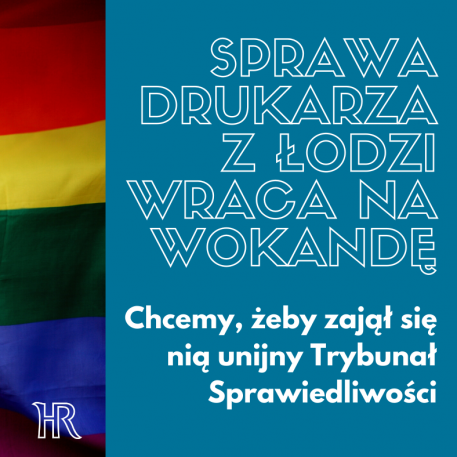
Court to reopen printing discrimination case. HFHR: CJEU’s ruling needed
♦ On 30 December 2019, the Court of Appeal in Łódź will consider a motion for the reopening of proceedings in the case of a printer from Łódź who refused to produce a roll-up for an LGBT organization.
♦ The prosecution service moved to quash the printer’s conviction.
♦ The HFHR has submitted an amicus curiae brief in the case, arguing that questions should be referred to the CJEU for a preliminary ruling. The organization denied the printing service is represented by lawyers from the Campaign Against Homophobia.
The motion of the prosecution service to reopen the proceedings was submitted in the wake of a June judgment of the Constitutional Tribunal, which declared unconstitutional the provision that formed the basis for the printer’s conviction.
Denial of a service based on religious beliefs
In 2015, an employee of a printing company refused to print a roll-up for an LGBT advocacy foundation, invoking his religious beliefs. In 2017, the man was found guilty of committing the offence of the unreasonable refusal of performing a service. In 2018, his conviction was affirmed by a Regional Court and the Supreme Court.
According to the rules of criminal procedure, proceedings may be reopened if the provisions that formed the basis for an individual’s conviction are declared unconstitutional in a judgment of the Constitutional Tribunal. However, the HFHR argues in its amicus curiae brief presented to the Łódź Court of Appeal that there are substantial concerns over the validity of the June Tribunal’s judgment.
To support the above conclusion, the HFHR points to the following:
– the judgment was issued by the Tribunal’s panel comprising a person without authority to adjudicate, namely Mr Mariusz Muszyński, who was elected to a seat on the Tribunal’s bench that had been assigned to a lawfully elected judge;
– there are reasonable concerns as to the validity of allocation of cases between panels of the Constitutional Tribunal;
– the appointment of the Tribunal’s President gives rise to controversy.
HFHR: a preliminary reference to the CJEU is needed in this case
The Foundation advises the Court of Appeal that the case poses questions that should be referred to the CJEU for a preliminary ruling. The key aspect that the CJEU should clarify is whether, in view of the EU principles of the rule of law, effective judicial protection of legal rights and the general principle of non-discrimination, a court has the power to disregard a motion for the reopening of proceedings and avoid the legal effects of the national constitutional court’s judgment on the grounds of irregularities concerning that the constitutional court. In its brief, the HFHR points out that the Constitutional Tribunal’s judgment has seriously weakened the protection against discriminatory acts in access to goods and services afforded to representatives of minority groups.
“If the court accepts the motion for reopening the proceedings, the irregularities concerning the Tribunal’s judgment would effectively impact the appellate proceedings”, explains Jarosław Jagura, a lawyer of the HFHR. “The application of a defective constitutional judgment in a specific case would lead to a violation of values and principles of EU law”, he adds.
The counsel of the Campaign Against Homophobia representing the organisation that ordered the roll-up, supported the arguments presented in the HFHR’s brief, seeking the dismissal of the motion to reopen the proceedings.
Timeline:
⇒ May 2015 – the printing company’s employee refuses to print the roll-up.
⇒ 31 March 2017 – a Łódź District Court finds the printer guilty of the petty offence contrary to article 138 of the Petty Offences Code, namely “intentional refusal to perform a service without a reasonable cause”.
⇒ 26 May 2017 – the Regional Court in Łódź affirms the first instance judgment.
⇒ 14 June 2018 – the Supreme Court dismisses the Prosecutor General’s complaint in cassation against the Regional Court’s judgment, confirming that the validity of the conviction.
⇒ 26 June 2019 – responding to an application for a constitutional review from the Prosecutor General, the Constitutional Tribunal finds that the provision of the Petty Offences Code that formed the basis for the printer’s conviction is unconstitutional (case no. K 16/17).
⇒ 7 August 2019 – a Deputy Circuit Prosecutor in Łódź files a motion for the reopening of the proceedings in the printer’s case.
⇒ 30 December 2019 – the Court of Appeal in Łódź is to hear the prosecutor’s motion.


03.01.2020
 Cookies EN
Cookies EN